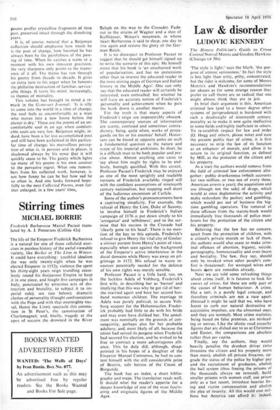Stirring times
MICHAEL BOBBIE
Frederick Barbarossa Marcel Pacaut trans- lated by A. J. Pomerans (Collins 42s)
The life of the Emperor Frederick Barbarossa is a natural for one of those celluloid exer- cises in painless history of the awful-viewable variety, like Becket or The Lion in Winter. It could have everything: youthful idealism (he was only twenty-eight when he was elected Emperor in 1152); violence (he spent his thirty-eight years reign trundling cease- lessly round his fissiparous Empire to keep it in one piece, and fought five campaigns in Italy, punctuated by atrocious acts of des- truction and brutality, to subject it to im- perial rule); sex (see below); dramatic clashes of personality (fraught confrontations with the Pope and with that overmighty vas- sal, Henry the Lion); spectacle (his corona- tion in St Peter's, the canonisation of Charlemagne); and, finally, tragedy at the apex of success (he drowned in the River
Saleph on the way to the Crusade). Fade- out to the strains of Wagner and a shot of Kyffhauser, Wotan's mountain, in whose heart Barbarossa is said to sleep, one day to rise again and restore the glory of the Ger- man Reich.
It is no disrespect to Professor Pacaut to suggest that he should get himself signed up to write the scenario of this epic. He himself states that his book is 'an unashamed work of popularisation, and has no pretensions other than to interest the educated reader in the most stirring pages of German and Italian history in the Middle Ages'. One can only say that the educated reader will certainly be interested, even enthralled; but whether he will have an accurate notion of Frederick's personality and achievement when he puts the book down is another matter.
For the truth is that many aspects of Frederick's reign are impenetrably obscure. The contemporary sources of information are scanty, confused and sometimes contra- dictory, being, quite often, works of propa- ganda on his or his enemies' behalf. Histor- ians can be found at opposite poles on such a fundamental question as the nature and scope of his imperial ambitions. In short, he is a difficult man to be both popular and pre- cise about. Almost anything one cares to say about him ought by rights to be end- lessly, boringly qualified. With this caveat, Professor Pacaut's Frederick may be enjoyed as one of the most sprightly and readable versions of Frederick available; tinged still with the confident assumptions of nineteenth century nationalism, but stopping well short of the ludicrous encomium of Carlyle.
Some of the author's pronouncements have a captivating simplicity. For example, the refusal of Henry the Lion, Duke of Saxony, to involve himself in Frederick's Italian campaign of 1176 is put down simply to his 'arrogance' and 'selfishness', and to the sur- mise that his success in the Crusade had 'clearly gone to his head'. There is no men- tion of the key to this episode, Frederick's refusal to give Henry the vital city of Goslar: a sinister portent from Henry's point of view, especially when seen against the background of the Emperor's active interference in the ducal domains while Henry was away on pil- grimage in 1172. His refusal to waste re- sources potentially needed for the defence of his own rights was merely sensible.
Professor Pacaut is a little hard, too, on the luckless Adela of Vohburg, Frederick's first wife, in describing her as 'barren' and implying that this was why he got rid of her: she married again and bore her second hus- band numerous children. The marriage to Adela was purely political, to secure Voh- burg support for the Hohenstaufen. Freder- ick probably had little to do with his bride and may even have disliked her. The annul- ment was nominally on the grounds of con- sanguinity, perhaps also for her probable adultery, and, most likely of all, because the union had served its purpose when Frederick had secured his election, and he wished to be free to contract a more advantageous alli- ance. This he duly did, although, disap-
pointed in his hopes of a daughter of the Emperor Manuel Comnenus, he had to con- tent himself with the still considerable prize of Beatrix, sole heiress of the Count of Burgundy.
The book has an index, a short biblio- graphy and maps. The translation reads well.
It should whet the reader's appetite for a deeper knowledge of one of the most fascin- ating and enigmatic figures of the Middle Ages.






































 Previous page
Previous page